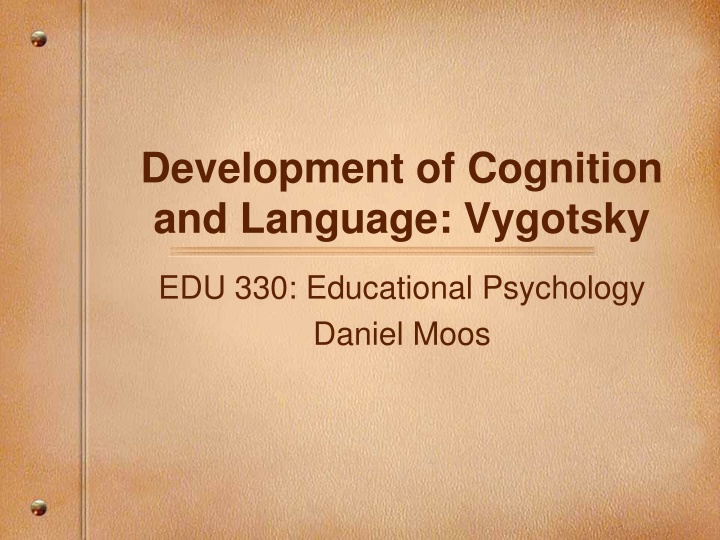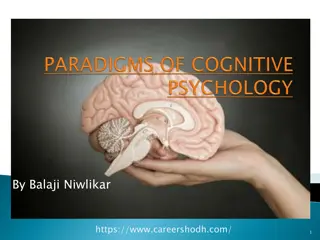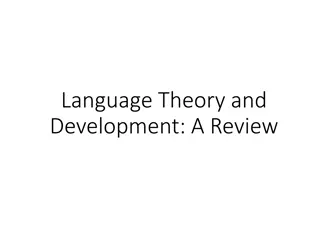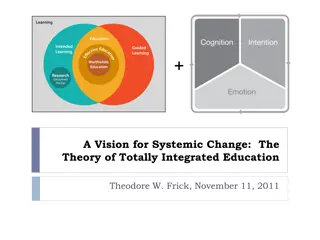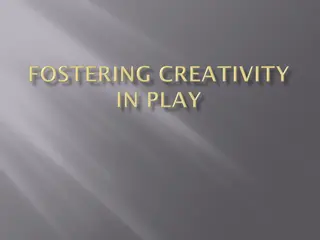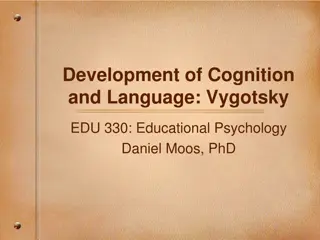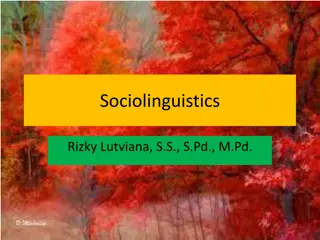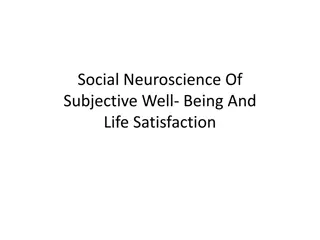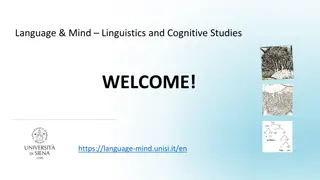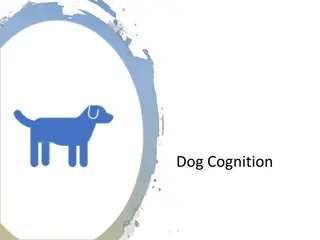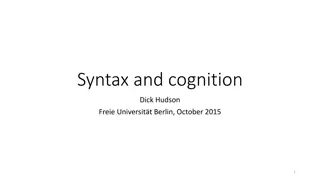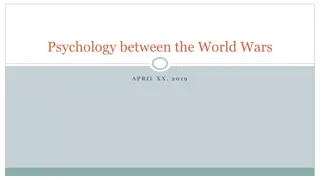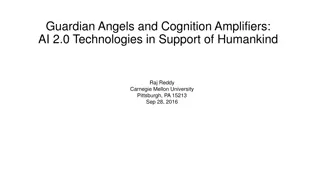Development of Cognition and Language: Vygotsky's Social-Historical Theory
Lev Vygotsky's Social-Historical Theory emphasizes the critical role of social and cultural interactions in cognitive development. It highlights the importance of language and assisted learning in shaping the higher mental functions of individuals. Through internalization, external social functions become internal mental processes, leading to effective learning and self-regulation. Explore how categorization, mediation, and psychological tools influence human learning within different cultural contexts.
Download Presentation

Please find below an Image/Link to download the presentation.
The content on the website is provided AS IS for your information and personal use only. It may not be sold, licensed, or shared on other websites without obtaining consent from the author.If you encounter any issues during the download, it is possible that the publisher has removed the file from their server.
You are allowed to download the files provided on this website for personal or commercial use, subject to the condition that they are used lawfully. All files are the property of their respective owners.
The content on the website is provided AS IS for your information and personal use only. It may not be sold, licensed, or shared on other websites without obtaining consent from the author.
E N D
Presentation Transcript
Development of Cognition and Language: Vygotsky EDU 330: Educational Psychology Daniel Moos
Procedure Sort the following words into whatever categories make sense and provide a label or rationale for each category. males, females, figs, kangaroo, meat, dogs, honey, bees, the moon, cigarettes, water, sun, spear, wine, wind, fish, mud, fire, birds, rainbow
Compare Compare your categories with the following created by aborigines in Australia
Categories Bayi: males, kangaroo, the moon, rainbow, fish, spear myths and beliefs: rainbows are believed to be mythical men Balan: females, dogs, birds, fire, water, sun experience: water extinguishes fire; myths and beliefs: birds are believed to be female spirits; dangerous and exceptional things are put in a minimally contrasting category: dogs are considered exceptional animals, so they appear in the second class instead of with men Balam: figs, honey, wine, cigarettes experience: wine is made from fruit Bala: meat, bees, wind, mud
Internalization Any higher mental function necessarily goes through an external stage in its development because it is initially a social function. Lev Vygotsky
1. HUMAN LEARNING CANNOT BE UNDERSTOOD INDEPENDENT OF THE SOCIAL AND CULTURAL FORCES THAT INFLUENCE INDIVIDUALS** 2. CRITICAL ROLE OF LANGUAGE 3. IMPORTANCE OF ASSISTED LEARNING
LEV VYGOTSKY SOCIAL-HISTORICAL THEORY OF COGNITIVE DEVELOPMENT SOCIAL AND CULTURAL INTERACTIONS ARE CRITICAL TO LEARNING INDIVIDUALS CREATE PSYCHOLOGICAL TOOLS TO LEARN AND TO MASTER THEIR BEHAVIOR
The central fact about psychology is the fact of mediation. Lev Vygotsky Intervention that focuses on experience during the processes of thinking and learning (metacognition); goal is to facilitate effective learning behavior Learning how to learn (self-regulation) Translating student s language
The central fact about psychology is the fact of mediation. Lev Vygotsky Two mothers take their sons to the science museum. One of the mothers encourages her son to go on his own. He goes to various work stations, punches buttons, gets lights and noises and then runs to another station where he punches more buttons. He has a good time, exploring on his own. The other Mother goes with here son to a work station and before they push any keys asks him, "What do you think will happen if we push this key?" Then they push it and discuss the result. She encourages him to form hypotheses as to why one result or another is obtained. They try to improve their predictive ability, together. Together they monitor the child's improving capacity to predict.
The central fact about psychology is the fact of mediation. Lev Vygotsky Self-regulation and private speech Private speech: phenomenon in young children in which they spontaneously articulate commands, descriptions and reminders to themselves (self-talk) Private speech is a powerful clue to the linguistic character of human thought. Can you think of examples where you have used private speech / self-talk for a new task? How can you support students private speech / self-talk? Why do you think it is important as a teacher?
THE ZONE OF PROXIMAL DEVELOPMENT . . . is the distance between the actual developmental level as determined by independent problem solving and the level of potential development as determined through problem solving under adult guidance or in collaboration with more capable peers Lev Vygotsky, 1935
POTENTIAL LEVEL L E A R N I N G ACTUAL LEVEL ZPD INSTRUCTION
Vygotsky s Theory: Summary of assumptions Learning and Instruction with ZPD Learning Natural byproduct of involvement in tasks with adults or more competent peers Vicarious Learning Private Speech: Thinking aloud Early years: End of task Later years: Beginning, during, and end of task Instruction Scaffolding Fading
Language: Suggestions for Teachers Students cannot get too much practice in their use of language. Particularly true in math and science Remind students that struggling to put understanding into words is a normal part of learning and development. We ve all said at some point in our lives. I know what I m trying to say, I just can t put it into words. Provide students with scaffolding as they practice language. Provide technical terms Embellish students descriptions
Evaluation of the Theory Strengths Attention of social, cultural, and context variables in learning Sensitivity to diversity of development Focused on individual differences (unlike Piaget) Weaknesses Vagueness of notion of ZPD Insufficient attention to development issues Difficulties of studying cultural-historical contexts
CONCEPTUAL DIFFERENCES BETWEEN VYGOTSKY PIAGET and 1. COGNITIVE DEVELOPMENT IS PRIMARILY A FUNCTION OF SOCIO-CULTURAL INTERACTION Adult-child interaction INDIVIDUAL CONSTRUCTION Active agency
Comparison of Piaget and Vygotsky Piaget Vygotsky More strongly influenced by peers More strongly influenced by those more intellectually advanced Role of Social Interaction Instruction important; zone of proximal development (ZPD) Formal instruction does not have significant impact Role of Instruction
